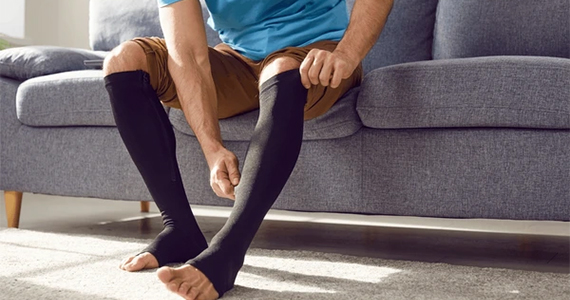Day or Night? When Should You Wear Compression Stockings?
Day or Night? When Should You Wear Compression Stockings?
 Compression stockings are a standard treatment that improves blood flow, aids in managing chronic health conditions such as varicose veins, and prevents or reduces swelling in the legs. However, they often have one common question to ask the experts at Grandview Physiotherapy: “Should I be wearing the compression stockings during the daytime, at night, or both times?”
Compression stockings are a standard treatment that improves blood flow, aids in managing chronic health conditions such as varicose veins, and prevents or reduces swelling in the legs. However, they often have one common question to ask the experts at Grandview Physiotherapy: “Should I be wearing the compression stockings during the daytime, at night, or both times?”
We’ll break it down to help you make the best decision for your health and comfort.
How Do Compression Stockings Work?
Compression socks exert a gentle, graduated pressure on your legs, thus aiding the flow of blood back toward the heart. This can:
- Reduce swelling (edema)
- Stop blood clots (deep vein thrombosis or DVT)
- Relieves discomfort from varicose veins
- Support athletes in recovery
But to get the most out of these benefits, timing could be everything.
When Should You Wear Compression Stockings Throughout the Day
Compression socks are typically best worn during the day for most people. Here’s why:
You’re Upright and Active: When you are standing or sitting, gravity pulls blood down. This can result in blood pooling in the feet and ankles, which can cause swelling and discomfort. Compression stockings help counteract this, promoting good circulation.
Great for those Sitting or Standing for extended periods: Are your feet stationary while working, or do you stand all day (office workers, nurses, retail workers, truck drivers)? Compression stockings can make a difference in easing leg fatigue and discomfort.
Helpful for Travel: Wearing compression socks for long flights or road trips can help to protect against DVT and minimize travel-related pain.
Do You Need Compression Stockings at Night?
Wearing compression stockings at night is usually not prescribed. However, your medical professional may recommend it in some cases. Here’s why:
Minimal Circulatory Stress When Recumbent: While you’re sleeping or resting in a horizontal position, gravity is not as effectively pulling the blood downward. Your veins aren’t the worst for wear, and wearing them may occasionally be more harmful than helpful.
Risk of Fitting Incorrectly or Circulatory Issues: If compression stockings roll or are overly tight while you sleep, they can prevent — not promote — blood flow. This is particularly a problem for people with arterial or nerve disease.
Exceptions: When Night Wear Is Acceptable
Overnight use might be recommended for some medical situations:
- Recovery after surgery when mobility is restricted
- Severe venous insufficiency
- Use as directed by your healthcare professional.
Should your therapist at Grandview Physiotherapy prescribe night compression, your therapist will prescribe an appropriate type and fit, with appropriate instructions, and set it up.
How to wear compression stockings
- Put them on in the morning while swelling is low
- Proper Fit: stockings should fit snuggly and not be too tight!
- Care Guide: Recommend hand washing and hanging dry with cold water. Please do not use bleach.
- Take these out before going to sleep unless directed to keep them in at night.
Closing Thoughts: Daytime for Most of You
For most individuals, the best and safest time to use compression stockings is during the day. If you’re worried about any aspect of postnatal fitness or have specific medical issues, seek individual advice from a physio or GP.
You can always count on us for the proper compression wear for your legs and the support you need for better circulation and healthier living.
